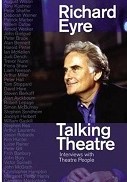| Writers Talking |
Theatre Writer Book |
| Richard Eyre “Talking Theatre” , Nick Hern Books , December 7, 2009 |
 “Talking Theatre” comprises 42 interviews across the spectrum of theatre. That spectrum includes 10 British writers. Some of the material is familiar. Alan Bennett and Harold Pinter are well-known public figures, their lives and opinions given frequent publicity. But Richard Eyre is an interviewer from theatre's inside and elicits valuable insights.
“Talking Theatre” comprises 42 interviews across the spectrum of theatre. That spectrum includes 10 British writers. Some of the material is familiar. Alan Bennett and Harold Pinter are well-known public figures, their lives and opinions given frequent publicity. But Richard Eyre is an interviewer from theatre's inside and elicits valuable insights. Writers for theatre are connected to the form and tradition in different ways. Arnold Wesker was engaged in making theatre more accessible. It led to the foundation of Centre 42 in the Roundhouse in Camden. Wesker reveals that it had the support of Rattigan. Peter Gill is vocal on the historic role of D H Lawrence. “He was probably the first English playwright to write truthfully about the working class. Nobody had written like that: making no apology for why you were writing about them. He wrote about these apparently poor people as something he wanted to write about, not something he had to write about. So it's not from a class position: it's from a position of equality.” As for antecedents Harold Pinter: “I was very, very, very engaged with Shakespeare, and the Elizabethans, and the Jacobeans, from all my teens and all my youth and throughout my twenties. Webster left an enormous impression on me, and I read Shakespeare long before I read Beckett.” Peter Shaffer: “I don't think I had any playwright models at all, other than the great comedies, say of the eighteenth century. Sheridan was a model in a way.” Tom Stoppard offers different views on two way-breaking pieces. At the Royal Court for “Look Back in Anger” “I thought it was a wonderfully well-written play...I admire the play very much but I don't attach to it enormous significance other than as a social phenomenon.” But Stoppard looks at Stratford East differently. “I was at the first night of “Oh! What a Lovely War”...and next to me was a veteran of that war, a very old man with no teeth. I didn't know him, but in the interval he turned to me weeping and said “I was there. That's what it was like.” Alan Ayckbourn dispels the idea that Scarborough is a preparation for London. “I do not “try my plays out” in Scarborough: I write for Scarborough. I write for a community. I write for as wide a community as I can possibly manage. I've always said to myself, if I walk down the street to the theatre and someone stops me and says “I'm coming to see your play, will I enjoy it?” and I look at them and say “No”- then I've got something very, very wrong. Whether they're the local doctor or the local plumber, they both should find something in the play, and if they don't then I'm doing it wrong. And that has kept me as wide as I can get.” Lastly, Alan Bennett reprises in conversation the essence of the Drummer Hodge which he put on stage in “the History Boys.” “When you're reading a book or whatever or seeing a play, and you come across a sentiment or a thought which you think is unique to you and personal to you, and here it is put in the mouth of somebody else, you feel connected. You feel as if somebody's taken your hand.” |
Reviewed by: Adam Somerset |
This review has been read 1417 times There are 34 other reviews of productions with this title in our database:
|
